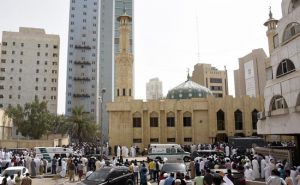Janjivan Bureau
Beirut Lebanon: In a matter of hours and on three different continents, militants carried out attacks on Friday that killed 54 of civilians, horrified populations and raised thorny questions about the evolving nature of international terrorism and what can be done to fight it. On the surface, the attacks appeared to be linked only by timing.
In France, a man stormed a U.S.-owned chemical plant, decapitated one person and apparently tried to blow up the facility. In Tunisia, a gunman drew an assault rifle from a beach umbrella and killed at least 39 people at a seaside resort. And in Kuwait, a suicide bomber blew himself up inside a mosque during communal prayers, killing at least 25 Shiite worshipers.
The Islamic State group claimed responsibility for the attacks in Tunisia and Kuwait, according to statements released on Twitter.
But it almost did not matter for terrorism’s global implications whether the three attacks were coordinated. Each in a different way underlined the difficulties of anticipating threats and protecting civilians from small-scale terrorist actions, whether in a mosque, at work or at the beach.
The attacks occurred at a time of fast evolution for the world’s most dangerous terrorist organizations, which continue to find ways to strike and spread their ideology despite more than a decade of costly efforts by the United States and others to kill their leaders and deny them sanctuary.
The United States has killed leaders of al-Qaida in Afghanistan, Yemen and elsewhere, but the group has maintained a string of branches and melded itself into local insurgencies. The Islamic State has worked on two levels, seeking to build its self-declared caliphate on captured territory in Iraq and Syria while inciting attacks abroad.
Fueling that expansion are civil wars and the collapse of state structures in Arab countries from Libya to Yemen that have opened up ungoverned spaces where jihadis thrive, while social media has given extremists a global megaphone to spread their message.
While officials in the three countries investigated the attacks, many noted that leaders of the Islamic State have repeatedly called for sympathizers to kill and sow mayhem at home.
Earlier this week, the spokesman for the Islamic State, Abu Mohammed al-Adnani, greeted the group’s followers for Ramadan, telling them that acts during the Muslim holy month earned greater rewards in heaven.
“Muslims, embark and hasten toward jihad,” Adnani said in an audio message. “O mujahedeen everywhere, rush and go to make Ramadan a month of disasters for the infidels.”
Tunisia, widely hailed as the sole success of the Arab Spring uprisings that began more than four years ago, suffered a sharp blow to its tourism sector, a pillar of the local economy.
The bombing in Kuwait followed the pattern of similar attacks on Shiite mosques in Saudi Arabia and was aimed at sowing sectarian divisions in a country where Sunnis and Shiites serve together in top government bodies and open friction between the sects is uncommon.
The motivation behind the attack in France was less clear, although the beheading suggested that the perpetrator had at least been inspired by the Islamic State, which frequently propagandizes similar executions in the territories it occupies.
And because the day’s events appeared to bear some of the infamous hallmarks of the Islamic State and its supporters, some analysts speculated that the attacks had been timed to mark the first anniversary of its declaration of a caliphate. Even if that is not the case, the SITE Intelligence Group, which tracks extremist propaganda, said the attacks inspired “celebration from Twitter accounts of jihadi fighters and supporters of the Islamic State.”
Middle East Center in Beirut, said, “We have entered a new jihadist era,” adding that the Islamic State had used its international brand to establish sleeper cells abroad, whose actions were meant to advance its efforts to build a state.
U.S. intelligence and counterterrorism officials were scrambling Friday to assess the connections, if any, between the attacks in France, Kuwait and Tunisia. Officials said that if the assessment found that the attacks were linked, officials would seek to determine whether the Islamic State had actively directed, coordinated or inspired them.
Attacks on 3 Continents 54 died
ADVERTISEMENT


















